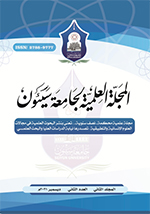
PRESS RELEASE 03062025 Deliverable D15 YHELD Progress report بيان صحفي بتاريخ 3 يونيو 2025م المُخرج D15 التقرير الدوري لمشروع تطوير مكاتب التعاون الدولي بالجامعات اليمنية.
released Deliverable D1.5 regarding the Progress Report. The YHELD project, an Erasmus-EDU-2023-CBHE initiative aimed at developing international relations offices (IROs) in Yemen's higher education institutions (HEIs), has achieved significant progress in its initial phase (December 1, 2023, to December 1, 2024)..
PRESS RELEASE 03/06/2025
Deliverable D1.5 YHELD: Progress report
بيان صحفي بتاريخ 3 يونيو 2025م
المُخرج D1.5: التقرير الدوري لمشروع تطوير مكاتب التعاون الدولي بالجامعات اليمنية
On November 29, 2024, LCU released Deliverable D1.5 regarding the Progress Report.
The YHELD project, an Erasmus-EDU-2023-CBHE initiative aimed at developing international relations offices (IROs) in Yemen's higher education institutions (HEIs), has achieved significant progress in its initial phase (December 1, 2023, to December 1, 2024).
1. Project Management, Quality, Monitoring and Evaluation (Work Package 1)
• Overall Management: The project leader oversaw the preparation of the Partner Agreement and was supported by a specialist in various operational activities. Management tools, including forms, templates, guidelines, and a project calendar, were presented to partners.
• Project Meetings: The Kick-Off Meeting was held online due to unforeseen circumstances. The project leader and Risk Manager were responsible for organizing, planning, and reporting on all meetings.
• Interim and Final Reports: The Link Campus University (LCU) developed the interim narrative and financial reports based on partner contributions, collected on a half-yearly basis.
• Risk Management Plan: LCU, with support from partner colleagues, developed a Risk Management Plan to predict risks, estimate impacts, and define responses to potential problems.
• Quality Assurance Plan: LCU drafted a Quality Assurance Plan (QAP) to ensure the quality of the project's processes and results. The QAP was discussed, validated by all partners, and used to ensure the timely delivery of milestones and deliverables.
• Reporting, Monitoring, and Scheduling: The Coordinator (LCU) worked with Work Package Leaders to ensure timely preparation of deliverables and milestones, adhering to the QAP's quality standards.
• Internal Evaluation: Partners evaluated processes, deliverables, and milestones through dedicated contributions included in half-yearly reports.
2. Assessment and Technological Empowerment (Work Package 2)
• Internal Assessment of Training Needs: ACEEU conducted an in-depth internal assessment, analyzing the abilities and capabilities of professors, researchers, staff, and governance board members at Yemeni universities. The assessment also focused on the resources the universities rely on and their interconnections.
• Development of Digital Infrastructure and E-learning Platform: ACEEU developed an e-learning platform based on free-to-use distance learning methods, with adjustments made for each HEI according to their specific needs, accompanied by a specific manual.
3. Training and Designing Strategies for IROs (Work Package 3)
• Definition of Training Programs and Schedules: Training programs are being prepared for online and in-person delivery. Key training topics include Leadership and Governance, Enablers and Support mechanisms, Research, and Teaching and Learning.
• Training on E-learning Platform Usage: Specific training on new distance teaching methodologies will be provided, focusing on the use of e-learning methods for teachers and their applications in teaching methods.
• SWOT Analysis: HEIs in Yemen conducted a SWOT analysis of institutional resources and practices to map internal resources and their interrelations.
• Design of Internationalization Strategy: The strategy relies on the assessment developed in WP2, on the results of the training and of the SWOT analyses of this WP. Targeted HEIs in Yemen, empowered through the training
Issues and Adjustments
• Several training activities (T3.3, T3.4, T3.5) have not yet been implemented.
• Training activities T3.1, T3.2, and T3.7 are being implemented partially online and partially in person.
• The Kick-Off Meeting was shifted to an online format.
For further information on YHELD
Your email address: a.damiani@unilink.it
Your website: https://research.unilink.it/yheld/
Your social media channels:
https://www.linkedin.com/school/linkcampusuniversity/posts/?feedView=all
PRESS RELEASE 03/06/2025
Deliverable D1.5 YHELD: Progress report
🚀 YHELD Project Update – Progress Report D1.5 Released!
📅 Period: Dec 1, 2023 – Dec 1, 2024
📍 Coordinated by Link Campus University (LCU)
🎯 Goal: Strengthening International Relations Offices (IROs) in Yemen’s Higher Education Institutions
🔍 Key Highlights:
✅ Project management tools, risk plan & quality assurance framework in place
✅ Successful internal assessment by ACEEU to map training needs
✅ E-learning platform developed & tailored for Yemeni HEIs
✅ Training programs in progress – focusing on leadership, governance, and e-learning methods
✅ Institutional SWOT analyses conducted to shape internationalization strategies
⚠️ Challenges:
Some training activities are pending or being partially delivered online/in person.
Kick-off meeting held online due to constraints.
📬 Want to know more?
🌐 Website: https://research.unilink.it/yheld
📧 Contact: a.damiani@unilink.it
🔗 Follow us: Link Campus University on LinkedIn
#YHELD #ErasmusPlus #HigherEducation #CapacityBuilding #Yemen #Internationalization #IROs #EUprojects #LCU #ErasmusCBHE
أصدرت جامعة لينك كامبس (LCU) في 29 نوفمبر 2024 المُخرج D1.5 المتعلق بالتقرير المرحلي.
حقق مشروع تطوير مكاتب التعاون الدولي بالجامعات اليمنية ( (YHELD تقدمًا ملحوظًا في مرحلته الأولى (من 1 ديسمبر 2023 إلى 1 ديسمبر 2024).
1. إدارة المشروع والجودة والرصد والتقييم (حزمة العمل1)
• الإدارة العامة: أشرف قائد المشروع على إعداد اتفاقية الشراكة بدعم من متخصص في مختلف الأنشطة التشغيلية. تم عرض أدوات الإدارة، بما في ذلك النماذج والقوالب والإرشادات والتقويم الزمني للمشروع على الشركاء.
• اجتماعات المشروع: عُقد الاجتماع الافتتاحي عبر الإنترنت نظرًا لظروف غير متوقعة. وكان قائد المشروع ومدير المخاطر مسؤولين عن تنظيم جميع الاجتماعات وتخطيطها وإعداد التقارير عنها.
• التقارير المرحلية والنهائية: أعدت جامعة لينك كامبس (LCU) التقارير السردية والمالية المرحلية بناءً على مساهمات الشركاء، والتي جُمعت على أساس نصف سنوي.
• خطة إدارة المخاطر: أعدت جامعة لينك كامبس ( (LCU، بدعم من الزملاء الشركاء، خطة لإدارة المخاطر لتوقع المخاطر وتقدير آثارها وتحديد الاستجابات المناسبة للمشكلات المحتملة.
• خطة ضمان الجودة: صاغت جامعة لينك كامبس (LCU) خطة ضمان الجودة لضمان جودة عمليات ونتائج المشروع. نوقشت الخطة وتمت المصادقة عليها من جميع الشركاء، واستُخدمت لضمان تسليم الإنجازات والمخرجات في الوقت المحدد.
• الإبلاغ والرصد والجدولة: عمل المنسق جامعة لينك كامبس (LCU) مع قادة حزم العمل لضمان الإعداد في الوقت المناسب للمخرجات والإنجازات، وفقًا لمعايير الجودة خطة ضمان الجودة.
• التقييم الداخلي: قام الشركاء بتقييم العمليات والمخرجات والإنجازات من خلال مساهمات مخصصة تم تضمينها في التقارير نصف السنوية.
2. التقييم والتمكين التكنولوجي (حزمة العمل2)
• التقييم الداخلي لاحتياجات التدريب: أجرى مجلس اعتماد الجامعات المنخرطة والمشتركة في الأعمال الحرة بألمانيا (ACEEU) تقييمًا داخليًا معمقًا، حللت فيه قدرات ومهارات الأساتذة والباحثين والموظفين وأعضاء مجالس الإدارة في الجامعات اليمنية. كما ركز التقييمأيضاً على الموارد التي تعتمد عليها الجامعات وترابطها.
• تطوير البنية التحتية الرقمية ومنصة التعليم الإلكتروني: طور مجلس اعتماد الجامعات المنخرطة والمشتركة في الأعمال الحرة بألمانيا (ACEEU) منصة تعليم إلكتروني مبنية على طرق تعليم عن بعد مجانية الاستخدام، مع تعديلات لكل مؤسسة تعليم عالي بما يتناسب مع احتياجاتها، مرفقة بدليل خاص.
3. التدريب وتصميم الاستراتيجيات لمكاتب العلاقات الدولية (حزمة العمل3)
• تحديد برامج التدريب والجدول الزمني: يتم إعداد برامج تدريبية لتُنفذ عبر الإنترنت وحضوريًا. تشمل مواضيع التدريب الرئيسية القيادة والحوكمة، والتمكين وآليات الدعم، والبحث العلمي، والتعليم والتعلم.
• التدريب على استخدام منصة التعليم الإلكتروني: سيتم تقديم تدريب محدد على طرق التعليم عن بعد الجديدة، مع التركيز على استخدام أساليب التعليم الإلكتروني وتطبيقاتها في أساليب التدريس.
• تحليل :SWOT أجرت مؤسسات التعليم العالي اليمنية تحليل SWOT للموارد والممارسات المؤسسية لرسم خريطة الموارد الداخلية وعلاقاتها المتبادلة.
• تصميم استراتيجية التدويل تعتمد الاستراتيجية على التقييم الذي تم تطويره في حزمة العمل2، وعلى نتائج التدريب وتحليلات SWOT في هذه الحزمة. وقد مكنت هذه الاستراتيجية مؤسسات التعليم العالي المستهدفة في اليمن من خلال التدريب.
القضايا والتعديلات
• لم يتم تنفيذ العديد من الأنشطة التدريبية (T3.3, T3.4, T3.5) حتى الآن.
• يتم تنفيذ الأنشطة التدريبية T3.1، T3.2، وT3.7 جزئيًا عبر الإنترنت وجزئيًا حضورياً.
• تمّ تحويل الاجتماع الافتتاحي إلى اجتماع عبر الإنترنت.
لمزيد من المعلومات حول مشروع تطوير مكاتب التعاون الدولي بالجامعات اليمنية:
البريد الإلكتروني: a.damiani@unilink.it
الموقغ الإلكتروني: https://research.unilink.it/yheld/
القنوات على مواقع التواصل الاجتماعي:
https://www.linkedin.com/school/linkcampusuniversity/posts/?feedView=all
.

